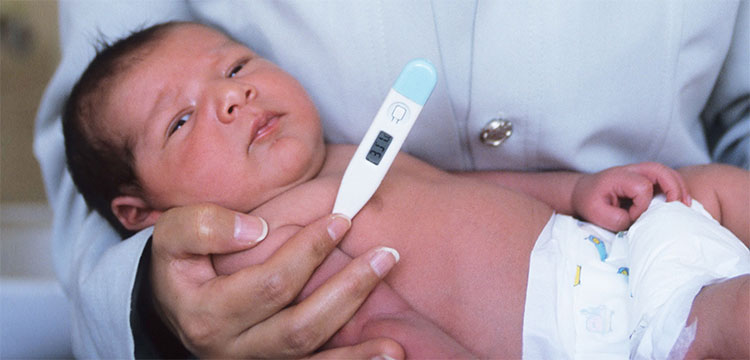
Breastfeeding within an hour of birth is critical for saving newborn lives
6 August 2018 – A new report by UNICEF and WHO reveals that an estimated 78 million babies – or 3 in 5 – are not breastfed within the first hour of life, putting them at higher risk of death and disease and making them less likely to continue breastfeeding. Most of these babies are born in low- and middle-income countries.
The report notes that newborns who breastfeed in the first hour of life are significantly more likely to survive. Even a delay of a few hours after birth could result in life-threatening consequences. Skin-to-skin contact along with suckling at the breast stimulate the mother’s production of breastmilk, including colostrum, also called the baby’s ‘first vaccine’, which is extremely rich in nutrients and antibodies.
In the Eastern Mediterranean Region, the practice of breastfeeding in the first hour of life, exclusive breastfeeding for 6 months, and continued breastfeeding for 2 years is low, which impacts child growth and survival and is associated with high rates of stunting, wasting, overweight and death in children under 5. Improving these practices, promoting, protecting and supporting breastfeeding through the Baby-friendly Hospital Initiative,1 as well as literacy and birth spacing, can help improve survival of children and mothers in the Region. Hence the support of early, exclusive and continued breastfeeding into the first and second years of life have short- and long-term positive outcomes on child health, growth and development over their life span and influence their survival.
Studies have shown that initiating breastfeeding in the first hour, skin-to-skin contact between mother and baby up to the first suckle can reduce neonatal mortality by 22% and have later effects on reducing death in infancy too.
“This is particularly important for low- and middle-income countries and communities in the Eastern Mediterranean Region, which are facing chronic emergencies, where malnutrition, neonatal and infant deaths are high. Promoting optimal breastfeeding practices can improve child survival rates and move countries closer to achieving the health-related targets of the Sustainable Development Goals. Breastfeeding is also one of the most cost-effective interventions for preventing obesity and noncommunicable diseases,” said Dr Ahmed Almandhari, WHO Regional Director for the Eastern Mediterranean
New analysis shows an investment of US$ 4.70 per newborn could generate US$ 300 billion in economic gains by 2025. Breastfeeding promotion can improve survival indirectly by promoting cognitive development and maternal health by reducing risk of breast and probably ovarian cancer, which are 2 leading causes of death among women in both developed and developing countries.
“When it comes to the start of breastfeeding, timing is everything. In many countries, it can even be a matter of life or death,” says Henrietta H. Fore, UNICEF Executive Director. “Yet each year, millions of newborns miss out on the benefits of early breastfeeding and the reasons – all too often – are things we can change. Mothers simply don’t receive enough support to breastfeed within those crucial minutes after birth, even from medical personnel at health facilities.”
“Breastfeeding gives children the best possible start in life,” says Dr Tedros Adhanom Ghebreyesus, WHO Director-General. “We must urgently scale up support to mothers – be it from family members, health care workers, employers and governments, so they can give their children the start they deserve.”
Despite the importance of early initiation of breastfeeding, too many newborns are left waiting too long for different reasons, including:
- Feeding newborns food or drinks, including formula: common practices, such as discarding colostrum, an elder feeding the baby honey or health professionals giving the newborn a specific liquid, such as sugar water or infant formula, delay a newborn’s first critical contact with his or her mother.
- The rise in elective C-sections: in Egypt, caesarean section rates more than doubled between 2005 and 2014, increasing from 20% to 52%. During the same period, rates of early initiation of breastfeeding decreased from 40% to 27%. A study across 51 countries notes that early initiation rates are significantly lower among newborns delivered by caesarean section. In Egypt, only 19% of babies born by C-section were breastfed in the first hour after birth, compared to 39% of babies born by natural delivery.
- Gaps in the quality of care provided to mothers and newborns: the presence of a skilled birth attendant does not seem to affect rates of early breastfeeding, according to the report. Across 58 countries between 2005 and 2017, deliveries at health institutions grew by 18 percentage points, while early initiation rates increased by 6 percentage points. In many cases, babies are separated from their mothers immediately after birth and guidance from health workers is limited.
The report urges governments, donors and other decision-makers to adopt strong legal measures to restrict the marketing of infant formula and other breastmilk substitutes.
The WHO and UNICEF-led Global Breastfeeding Collective also released the 2018 Global Breastfeeding Scorecard, which tracks progress for breastfeeding policies and programmes. In it, they encourage countries to advance policies and programmes that help all mothers to start breastfeeding in the first hour of their child’s life and to continue as long as they want.
1 The Baby-friendly Hospital Initiative is a global initiative led by UNICEF and WHO and aims at improving exclusive breastfeeding rates by implementing the Ten steps to successful initiation and continuation of breastfeeding. The Ten steps to successful breastfeeding are: 1) hospital policies; 2) staff competency; 3) antenatal care; 4) care right after birth; 5) support mothers with breastfeeding; 6) supplementing; 7) rooming-in; 8) responsive feeding; 9) bottles, teats and pacifiers; and 10) discharge.
Related links
UNICEF photos available for download
Data on countries and territories
Reported data are from UNICEF’s Global Databases





